Why Do Some Ideas Never Die?
Understanding the Lindy Effect to Separate the Signal from the Noise
Let’s start with a mental exercise. What was the biggest news headline last January? Give it a moment's thought. Ready?
🛑 Vote now—this is your last chance!
If you guessed Taylor's Grammy win or the earthquake, unfortunately, that's not quite right. If you chose not to vote, well done, because the poll was as useless as reading the news.
Let’s do another mental exercise. I am pretty sure you’ve spent at least 2-3 hours in the past week scrolling on Reels or TikTok. Don’t lie, I know you have. So, comment below what was the viral trend on Reels last week?
Struggling? I can understand, you’re not alone. The internet is bursting with noise and pulling out the signal - the meaningful content - that you can use to make better decisions is difficult.
Consider this astonishing fact: a single daily edition of the New York Times in 1979 contained as much information as an educated person from the 16th century would encounter over an entire lifetime.1
In 1979! This was even before the release of the Macintosh, the spread of the internet, mobile phones and apps, and social media. Can you imagine what this will be in 2024?
So, we desperately need a reliable filter to help us distinguish the essential from the ephemeral. We don’t want to be on a diet of deep-fried broccoli.
The Lindy Effect helps you to filter the noise from the signal and today, you will learn how to use it.
🧐 Understanding the Lindy Effect: A Gateway to Timeless Wisdom
We usually assume that “new” means “better”. But is it true?
If you hear advice from your grandmother, the odds are that it will come true. Sometimes, the ideas and principles which have withstood the test of time are far more likely to be better.
The Lindy Effect theorises that the longevity of non-perishable items—be it ideas, technology, or principles—indicates their likelihood of persisting into the future.
Simply put, the longer something has lasted, the longer it likely will continue to last.
🚨 Quick sidebar: Enjoying what you're reading? Bet you've got a friend who would too. Share and help me grow this community.
Psttt, they will also get a free copy of my ebook, Framework for Thoughts, when they sign up!
A Night at Lindy's: The Unlikely Birthplace of a Profound Insight
Originating from a 1964 article by Albert Goldman, the concept took its name from Lindy's, a famed New York deli at Broadway and 51st. This was where comedians analyzed their acts over cheesecake.2
Goldman noted a paradox: TV comedians with frequent gigs tended to fade quickly, while those who limited their appearances often enjoyed longer careers.
Antifragility: When Endurance Means Improvement
Nassim Nicholas Taleb later brought the Lindy Effect into the limelight in his book Antifragile. He observed:
This, simply, as a rule, tells you why things that have been around for a long time are not "aging" like persons, but "aging" in reverse. Every year that passes without extinction doubles the additional life expectancy.
This suggests that enduring technologies or ideas don’t just age out of value; they improve with time.
📚 The physical copy of The Art of War may deteriorate, but the strategies it contains remain timeless.
🪑 The basic design of a chair—four legs and a seat—hasn't changed in 5,000 years.
😎 The Hero’s Journey, utilized in both Homer’s Odyssey and Star Wars, shows that compelling storytelling is timeless.

⏳ When the Lindy Effect Doesn't Apply: Recognizing Limits
Perishability Paradox: The Boundaries of Timelessness
Only the nonperishable can be Lindy-compatible. You cannot apply the Lindy Effect to perishable items.
For example, if you survive for another year your future life expectancy generally decreases. You are not going to age in reverse.
Heuristic, Not Rule
While the Lindy Effect provides a helpful framework for evaluating the potential longevity of something, it's not foolproof. It serves as a heuristic rather than a definitive rule.
🎶 The music charts show that a number one single can and will drop off the top charts even if it has been at number one for many weeks.
🏦 Even though Lehman Brothers was founded in 1847, it went bankrupt over a weekend.
💉 If you are diagnosed with cancer, seek chemotherapy rather than relying on ancient Roman medical practices.
The Lindy Effect works on your protection, urging you to step back amidst the relentless surge of modern technologies, new products, and ideas, and ask yourself, “Has this lasted long enough for me to pay attention?”
💡Applying Lindy to Your Life: Beyond Perishability
Navigating Noise: The Lindy Effect in the Information Era
📰 News: News functions like a drug, convincing us that its consumption enhances our knowledge and contributes to our personal development. In reality, the effect is quite the opposite.
We are bombarded with constant updates, covering events from corners of the globe we'll likely never visit, and broadcasting mundane local incidents as “breaking news”.
News media are battling with social media for our attention aiming to scoop up a larger slice of advertising revenue. Their strategy? Share more negative news to fill your brain with ideas that are just average but presented in a way that makes you feel wiser.
🤫 But here’s the truth: Consuming more news makes us less well-informed.
Taleb calls it the noise bottleneck: As you consume more data, the noise-to-signal ratio increases, so you end up knowing less about what is actually going on.
Want to know more about the world? Turn off the news.
So, what do you do instead? You buy books.
📚 Books: Now you're in search of a book recommendation—what’s your next step? Perhaps you turn to Google or Amazon, scanning reviews and ratings to decide.
Maybe you have friends (?) and ask them for their suggestions. But have you considered how they find their book recommendations? Most likely, they too start with a search.
Keep in mind, that Google's algorithms tend to prioritize recent content. Unless you specifically search for "books written in the 16th century," the results are skewed towards newer publications.
This recency bias isn't just a quirk of search engines; it also affects how writers conduct their research because they use the same tools!
This influence extends to writing styles as well. Take, for instance, the prevalence of 'Malcolms'—lengthy anecdotes that set the stage for a chapter, named obviously after Malcolm Gladwell.
If you’ve read mainstream nonfiction in the last two decades, you've likely encountered the Malcolm method, whether you realized it or not.3 Even I did it in my newsletter on Opportunity Cost.
Books are starting to read and feel similar, as the content, ideas, and techniques used are recent.
😇 Valuable Knowledge: So, what to do about it? Haruki Murakami writes about it in Norwegian Wood:
I don’t want to waste valuable time reading any book that has not had the baptism of time. Life is too short.
Time is a natural filter for value. If something has been around for a long time, it means it is still important in some way. It’s worth knowing.
Read the Lindy books–older books have stood the test of time.
As humans get older, we have less time to live. But ideas don’t have a lifespan.
Avoid books heavily promoted by influencers and bypass the daily news cycle. Instead, opt for books that have stood the test of time—those that have been influential for over two decades and continue to be referenced.
That way, you can be pretty sure that what you’re learning will still be relevant decades from now.
If you only read the books that everyone else is reading, you can only think what everyone else is thinking.
Haruki Murakami
Investment and Innovation Through the Lindy Lens
💰 Money: The Lydians first used gold as a reliable way to store value, making it easier to buy goods without bartering. Gold has been valued for centuries, and according to the Lindy Effect, suggesting that it will remain precious for the foreseeable future.
And what about Bitcoin? The longer it remains significant, the more likely it is to continue being significant.
💼 Business: The Lindy Effect isn’t just for theories and books—it thrives in the boardrooms too. The idea is simple: the longer a company has been around, the better its chances of sticking around even longer.
Take new startups, for instance. They’re notoriously prone to early exits. Yet, every year they keep their doors open, their odds of enduring improve dramatically. It means they faced a crisis, management changes, competition, and expansion and survived.
Jeff Bezos tapped into the Lindy Effect when shaping his business strategy:
I very frequently get the question, “What’s going to change in the next ten years?” And that is a very interesting question; it’s a very common one.
I almost never get the question, “What’s not going to change in the next ten years?”
And I submit to you that that second question is actually the more important of the two…
You have to look for ideas that have stood the test of time.
📈 Investing: Warren Buffett famously refused to invest in the tech bubble in the late 90s and early 2000s. Everyone around him was making a bank in the market. We all know what happened next.
He suggests investing in companies in your Circle of Competence, having a strong moat, and good management. A moat and strong management culture is built over a long period.
You will never hear Buffett suggest this:

The Lindy Effect helps you avoid speculative bubbles and short-lived trends.
✍🏼 Creating for Centuries: The Lindy Effect for Creators
If you’re a creator—whether writing, art, or building a product—aim for work that will stand the test of time. A perennial seller. Be a Lindy creator.
As a writer, I am not judged by other writers and reviewers, but by readers. Not just today’s readers but also, those of tomorrow, and the day after tomorrow. So, the real judge of my work is… time.
As a creator, the Lindy Effect should inspire you to craft ideas that last—transforming noise into timeless signals.
Until next time,
Tapan (Connect with me on Twitter or reply to this email)
MONTHLY MULLING💡
If you liked this newsletter, you will find this past issue interesting. Find out if you’re feasting on nutritious 'broccoli' or indulging in the less beneficial 'deep-fried' version in your daily information diet. It’s all about what you consume!
Thank you for reading! 🙏🏽 Help me reach my goal of 3,000 readers in 2024 by sharing this post with friends, family, and colleagues! ♥️
The original article on Lindy’s Law by Albert Goldman

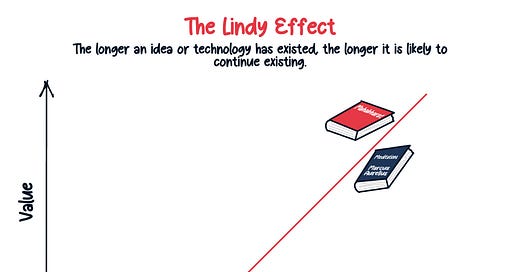


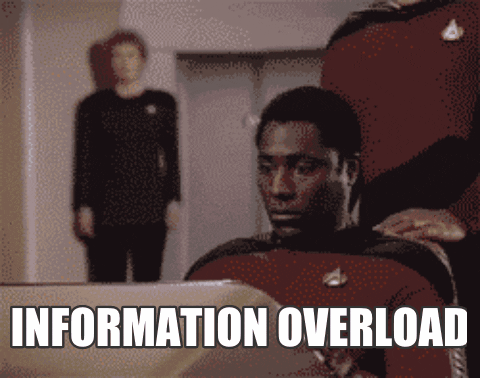

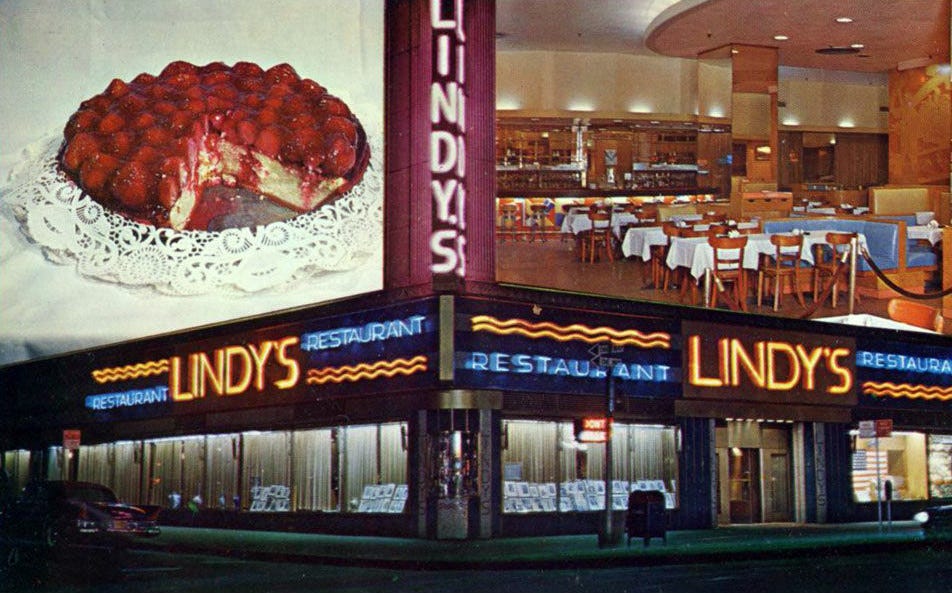
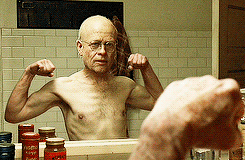

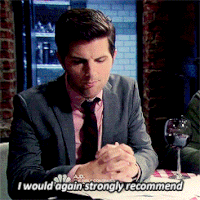
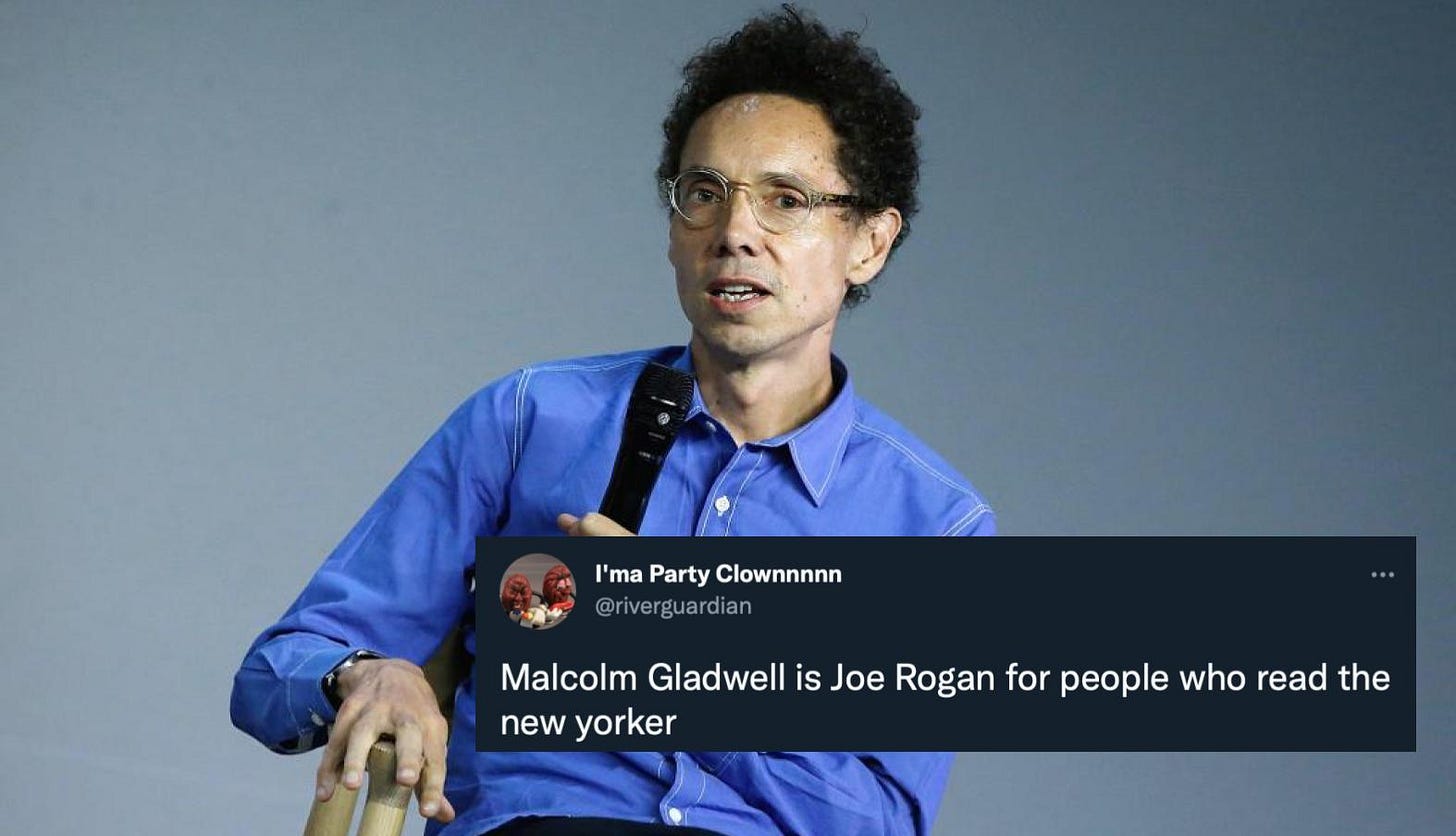
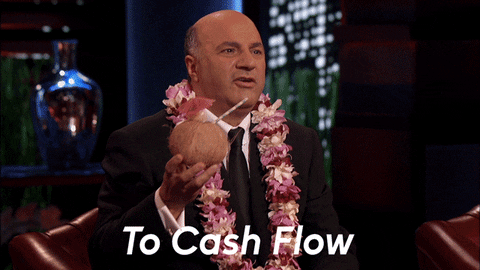

Great read. Hoping the Lindy effect holds true for Monthly Mulling!